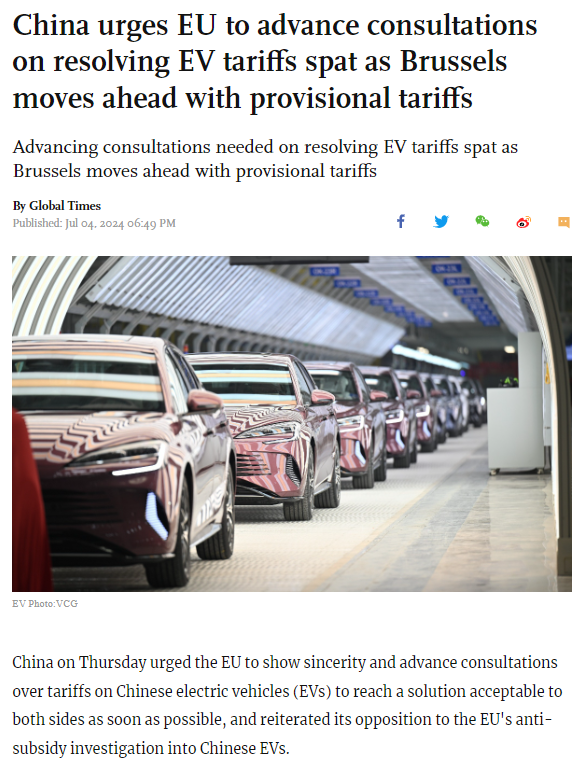LATEST INSIGHTS
Your Present Location: LATEST INSIGHTSWang Yiwei: China urges EU to advance consultations on resolving EV tariffs spat as Brussels moves ahead with provisional tariffs
Source: Global Times Published: 2024-07-04

By Global Times
Advancing consultations needed on resolving EV tariffs spat as Brussels moves ahead with provisional tariffs
China on Thursday urged the EU to show sincerity and advance consultations over tariffs on Chinese electric vehicles (EVs) to reach a solution acceptable to both sides as soon as possible, and reiterated its opposition to the EU's anti-subsidy investigation into Chinese EVs.
China's Ministry of Commerce (MOFCOM) spokesperson He Yadong made the remarks at a regular press conference on Thursday. The remarks came as the European Commission (EC), the EU's executive arm, confirmed its provisional import tariffs on major Chinese EV manufacturers from Thursday, despite strong opposition from government officials and major industry players within the bloc.
Multiple rounds of consultations were held at the technical level between China and the EU. There is still a four-month window before the arbitration. We hope that the EU could work with China in the same direction, show sincerity, advance the consultations, and reach a solution acceptable to both sides based on facts and rules as soon as possible, He said.
China has repeatedly expressed strong opposition to the EU's anti-subsidy investigation into Chinese EVs. China believes that economic and trade frictions must be properly handled through dialogue and consultation, the spokesperson noted.
The EC ruled on Thursday that the individual duties applying to the three sampled Chinese producers are 17.4 percent for BYD, 19.9 percent for Geely, and 37.6 percent for SAIC. Other EV producers in China, which cooperated in the investigation but were not sampled, are subject to the 20.8 percent weighted average duty. The duty for other non-cooperating companies is 37.6 percent.
These provisional duties will apply as of July 5, for a maximum duration of four months, the EC said. Within that timeframe, a final decision must be taken on definitive duties, through a vote by EU member countries. When adopted, this decision would make the duties definitive for a period of five years.
'The EU's move, despite entering a negotiation phase, was expected. With no significant shift in the EU's stance in such a short time, a positive result seemed unlikely,' Cui Hongjian, a professor at Beijing Foreign Studies University's Academy of Regional and Global Governance, told the Global Times on Thursday.
'After imposing temporary tariffs and proceeding with their implementation, both sides will enter the next round of negotiations,' Cui added, emphasizing that the discussions aim to avoid escalating tensions.
Experts warned that if the EU proceeds with permanent tariffs, it could potentially spark a trade war with China. 'The EU must now justify its actions internally and externally,' Cui stated. 'Whether this path leads to a potential trade war depends on negotiations from now until November.'
Wang Yiwei, a professor at the Renmin University of China's School of International Relations, told the Global Times that 'The EU's decision reflects protectionism and its struggle to maintain competitiveness in this field.'
On June 22, Chinese Minister of Commerce Wang Wentao held a video meeting with Valdis Dombrovskis, EC Executive Vice-President, where both sides agreed to immediately initiate consultations based on facts and rules to handle the case properly, according to MOFCOM.
The China Chamber of Commerce to the EU (CCCEU) expressed 'deep disappointment and dissatisfaction' over the EU's decision to impose high temporary anti-subsidy tariffs on imported Chinese EVs, according to a statement the CCCEU sent to the Global Times on Thursday.
'We firmly oppose this politically-driven trade protectionist move by the European side,' the chamber said. Chinese enterprises in Europe expect the European Commission to work with the Chinese side to find a constructive solution before the final ruling in November, to correct this trade protectionist practice, and ultimately help transform the green economy in China, Europe, and beyond, said the chamber.
The EU's tariff move on Chinese EVs has drawn great concern from government officials and major industry players, even from within the bloc.
BMW CEO Oliver Zipse said the introduction of additional tariffs will lead to a 'dead end' and will not strengthen European carmakers, according to a statement sent to the Global Times.
Opposing the EU's decision to impose anti-subsidy tariffs on EVs imported from China, the German Association of the Automotive Industry (VDA) expressed in a public statement on Wednesday its concerns, saying that the planned tariffs will make it more difficult to successfully ramp up electromobility and thus decarbonize and achieve the Paris CO2 climate targets.
In addition, the tariffs harm both European consumers and companies. They are therefore not in the interests of the EU, the VDA said.
The EC should refrain from imposing the announced anti-subsidy tariffs and find a negotiated solution with China, the German industry association said.
'We expressly welcome the joint dialogue that has already taken place between Brussels and Beijing. It is crucial that this dialogue is also conducted seriously. Decision-makers on both the European and Chinese sides must live up to their responsibilities and create fair competitive conditions for all economic actors that serve the goals of the transformation,' the VDA further noted.
Responding to the repeated expression of opposition by governments from several EU member countries and major automotive companies to the bloc's anti-subsidy probe on Chinese EVs, He said that China hopes that the EU will carefully listen to voices within the bloc, engage in consultations with China in a rational and pragmatic manner, and avoid anti-subsidy measures that could harm the mutually beneficial cooperation and common development of the automotive industries in China and Europe.
Key Words: Wang Yiwei, RDCY, China, EU, EV tariffs























































































 京公网安备 11010802037854号
京公网安备 11010802037854号





